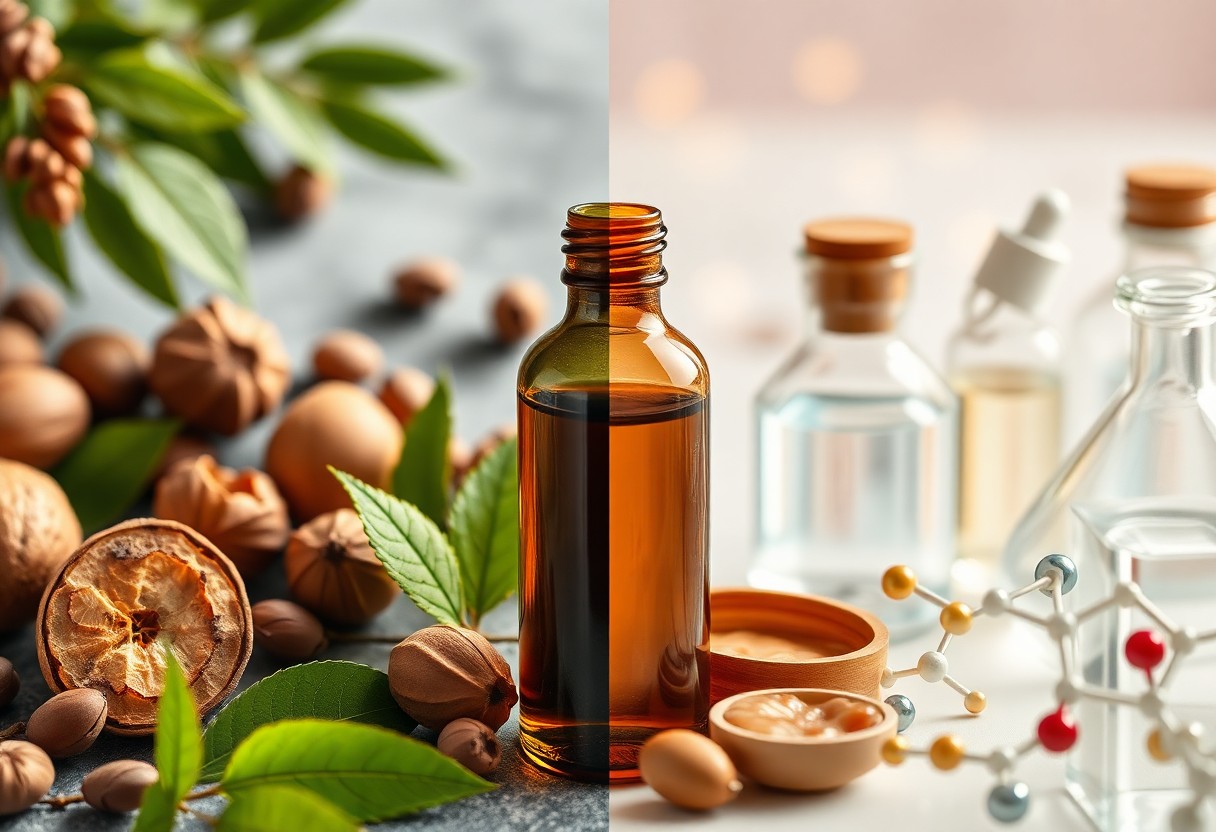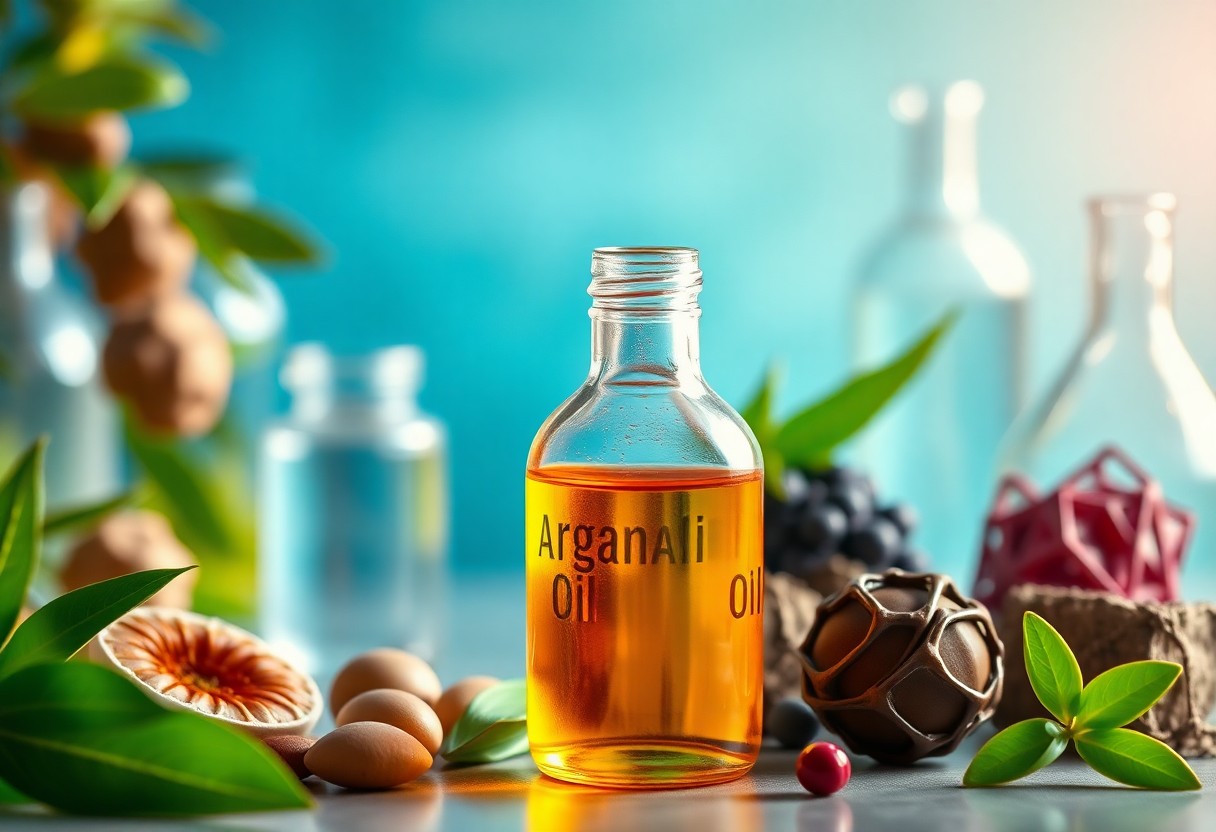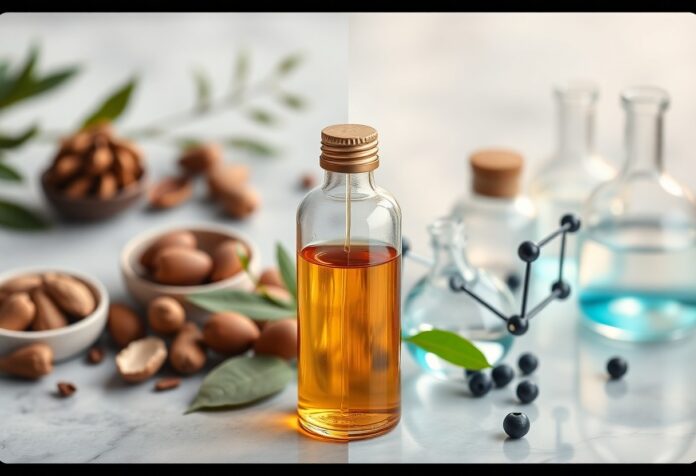Ingredients in your skincare routine can either coexist in harmony or create chaos, depending on their compatibility. Argan oil, with its rich composition, acts as a bridge, enabling natural elements to interact seamlessly with synthetic compounds. By understanding how this potent oil enhances the efficacy of both types of ingredients, you can elevate your regimen to achieve optimal results. In this guide, you’ll explore the unique properties of argan oil and discover how it fosters this intriguing synergy in your products, ultimately transforming your approach to skincare.
Key Takeaways:
- Moisture Retention: Argan oil serves as a powerful humectant, enhancing the ability of both natural and synthetic ingredients to lock in moisture.
- Antioxidant Properties: The oil is rich in vitamin E, which can boost the effectiveness of synthetic antioxidants and provide added skin protection.
- Emollient Effects: Argan oil contributes to skin softness and smoothness, complementing synthetic emollients to create a balanced formulation.
- Compatibility: Its versatile composition allows argan oil to work harmoniously with various synthetic ingredients, enhancing overall product performance.
- Natural Preservative: Argan oil can extend shelf life by providing some natural preservation qualities, aiding in the stability of synthetic formulations.

How-To: Understanding Argan Oil
For those who seek to embrace the nurturing qualities of argan oil, understanding its properties and applications is crucial. Argan oil, derived from the nuts of the argan tree indigenous to Morocco, is rich in fatty acids and antioxidants that contribute to its remarkable benefits for skin and hair. As you investigate deeper into its essence, you will find that the purest forms of argan oil often exhibit a golden hue and earthy aroma, signifying their potent natural origins. It’s important to discern between high-quality oils and those that may be diluted or mixed with other ingredients, which can diminish their efficacy.
How to Identify Quality Argan Oil
Assuming you wish to invest in high-quality argan oil, there are specific characteristics you should look for. First, examine the label for authenticity; genuine product should be labeled as “100% pure argan oil.” Furthermore, cold-pressed extraction is ideal as this method preserves the oil’s nutrients, ensuring that you harness its full benefits. Be wary of overly cheap options; high-quality argan oil may come at a premium, reflecting the labor-intensive process of harvesting and producing this precious oil.
How to Incorporate Argan Oil into Your Routine
On your journey to integrate argan oil into your daily regimen, there are several methods to consider. You can apply it directly to your skin in the morning and evening for hydration or mix it with your favorite moisturizer for enhanced nourishment. When incorporating it into your hair care routine, try using it as a leave-in treatment or a weekly mask, allowing its rich nutrients to work their magic. Furthermore, argan oil can serve as a topical remedy for specific areas that require extra attention, such as dry elbows or cracked heels.
The versatility of argan oil extends beyond its application; it can seamlessly enhance your skincare and haircare routines. By experimenting with different ways to incorporate this oil, you can discover what best suits your needs, whether you use a few drops on damp hair before styling or combine it with your serum for a hydrating boost. Throughout your exploratory journey, keep your environment in mind; store the bottle in a cool, dark place to maintain its integrity, thereby maximizing the benefits of this remarkable ingredient for your overall well-being.

Tips for Maximizing Synergy
Some strategies can help you maximize the synergy between natural and synthetic ingredients in your skincare routine. By understanding how to layer and combine these ingredients effectively, you can achieve enhanced results. Here are a few recommendations:
- Begin with clean skin to ensure the best absorption.
- Layer lighter, water-based products before heavier oils.
- Consider the pH levels of your products to promote compatibility.
- Test combinations on a small patch of skin before full application.
After exploring the compatibility of various components, you may find that integrating Argan Oil – Ingredient | Inside Our Products – L’Oréal into your routine offers exceptional moisture and nourishment.
Tips for Pairing Natural and Synthetic Ingredients
Tips for pairing natural and synthetic ingredients can lead to remarkable improvements in your skincare game. Establishing a personalized skincare regimen that harmonizes these diverse elements may result in better hydration and protection for your skin. Here are some ways to create effective combinations:
- Select synthetic ingredients formulated with proven efficacy.
- Incorporate natural oils that complement synthetic compounds.
- Evaluate the specific needs of your skin and adapt accordingly.
- Regularly update your routine based on skin responses.
Thou may discover that such thoughtful pairings contribute to a healthier and more radiant complexion.
Tips for Enhancing Effectiveness with Argan Oil
Argan oil can enhance the effectiveness of both natural and synthetic ingredients in your skincare routine. By recognizing how to leverage its properties, you can achieve superior results that align with your skin’s wellness. Consider these methods to amplify its benefits:
- Apply Argan oil after other serums for added hydration.
- Mix it in with your foundation for a dewy finish.
- Use it in conjunction with exfoliants to soothe post-treatment skin.
- Integrate a few drops into your deep conditioning hair masques.
Thou might realize that these synergistic techniques elevate your skincare practice substantially.
Ingredients combined with Argan oil can often become more effective due to its unique properties. When paired with antioxidants or peptides, it enhances their absorption and mitigates any potential irritation, leading to a more harmonious effect on your skin. Following these strategies may provide the key to unlocking a more vibrant appearance throughout your skincare journey.
- Research the specific benefits of all ingredients before combining them.
- Utilize products that highlight the strengths of Argan oil.
- Consult with skincare professionals to tailor your regimen.
- Stay informed on the latest research for innovative combinations.
Thou shall find that a balanced approach with these ingredients leads to greater overall satisfaction with your skincare experience.

Factors Influencing Effectiveness
Now, as you research into the intricacies of how argan oil interacts with both natural and synthetic ingredients, several factors come into play that can influence its overall effectiveness. Understanding these contributing aspects can help you make informed choices when selecting products that contain argan oil. Here are some key considerations:
- The purity and quality of argan oil used.
- Concentration levels of argan oil within the formulation.
- The specific combination of other ingredients in the formulation.
- The application method and method of delivery for the product.
Any variation in these factors can significantly impact how well argan oil performs, either alone or in synergy with other ingredients, as detailed in the Ingredient Deep Dive: Argania Spinosa (Argan) Oil. Grasping these elements leads to a more holistic understanding of your skincare choices.
Factors Affecting Ingredient Interaction
To truly appreciate the role of argan oil, you must consider the various factors that affect how ingredients interact with one another. The formulation environment where these ingredients meet can drastically change their behavior. Here are some determinants to keep in mind:
- pH levels of the product.
- Temperature during formulation and storage.
- Presence of stabilizers or emulsifiers.
- Time during which ingredients are allowed to blend.
This complex interplay is imperative for maximizing the therapeutic potential of the products you apply, highlighting the importance of scientific methodology in product formulation.
Factors Impacting Skin Response
You should also be aware of various factors influencing your skin’s response to formulations containing argan oil. Individual skin types can play a major role in determining how effective any ingredient is on your skin. Here are some key aspects to consider:
- Your skin type (oily, dry, combination, or sensitive).
- The health and condition of your skin barrier.
- Your environment, including temperature and humidity.
- Other products you may be using concurrently.
Thou might find that specific skin conditions, such as eczema or acne, can impact the efficacy of argan oil when used in formulations. Personal perception and administration also play a role in your experience with the product. Assessing how your skin reacts can lead to greater satisfaction with your skincare routine.
Affecting the overall results of a product containing argan oil is an amalgamation of both internal and external factors. This includes environmental influences, your overall health, and even your lifestyle choices. You may find that your unique skin response informs your decision-making, leading you to products that work harmoniously with your skin and lifestyle.
Summing up
Presently, you find yourself navigating the complex landscape of skincare and beauty, where the fusion of natural and synthetic ingredients creates a dynamic interplay that enhances product efficacy. Argan oil stands at the forefront of this synergy, serving as a bridge that harmonizes the benefits of nature with the innovative advancements of synthetic formulations. By integrating argan oil into your regimen, you not only embrace the rich heritage of nature but also leverage the precision offered by modern science to address your unique skin needs. This harmonious collaboration enables you to optimize your skincare routine, providing nourishment and hydration while supporting your skin’s natural barrier.
As you explore the myriad applications of argan oil, it becomes clear that its role transcends mere inclusion in products; it represents a paradigm shift in how you perceive beauty and wellness. Your choices, when informed by an understanding of how natural ingredients can complement synthetic innovations, empower you to curate a regimen that promotes both health and beauty holistically. Adopting this balanced approach allows you to experience the best of what both realms have to offer, enhancing not only your skin but also your overall perspective on personal care in a world where complexity and simplicity coexist harmoniously.
FAQ
Q: What unique properties does argan oil offer that enhance both natural and synthetic ingredients?
A: Argan oil is rich in vital fatty acids, antioxidants, and vitamins, particularly Vitamin E. These properties help to improve the stability and efficacy of synthetic ingredients while also promoting hydration and nourishment for the skin. The oil acts as a natural emollient, smoothing and softening skin, which can enhance the overall feel of synthetic formulations.
Q: How does argan oil support the effectiveness of synthetic skincare ingredients?
A: Argan oil can enhance the absorption of synthetic ingredients into the skin due to its lightweight texture and ability to penetrate easily. This synergy allows synthetic active ingredients, such as retinol or peptides, to work more effectively by ensuring they reach deeper layers of the skin. Moreover, argan oil helps mitigate potential irritation from synthetics, providing a more balanced skincare experience.
Q: In what type of products is the synergy between argan oil and synthetic ingredients most beneficial?
A: The synergy between argan oil and synthetic ingredients is particularly beneficial in serums, moisturizers, and hair care products. In serums, argan oil can provide hydration and support active ingredients, while moisturizers benefit from its emollient properties. In hair care, argan oil helps to smooth and protect hair while allowing synthetic conditioning agents to work effectively.
Q: Can argan oil be used to offset any negative effects of synthetic ingredients?
A: Yes, argan oil can serve as a buffer for potential irritants commonly found in synthetic ingredients. By incorporating argan oil into a formulation, it can help soothe the skin and reduce redness or irritation that may arise from the use of harsh synthetics. This protective effect makes it a valuable addition to formulations targeting sensitive or combination skin.
Q: Are there any formulation considerations when combining argan oil with synthetic ingredients?
A: When formulating products that combine argan oil with synthetic ingredients, it is important to consider the overall balance of the formulation. The concentration of argan oil should complement the other ingredients to maintain texture and effectiveness. Additionally, stability tests should be conducted, as the oil can affect the shelf life of certain synthetics, ensuring the final product remains effective throughout its use.

